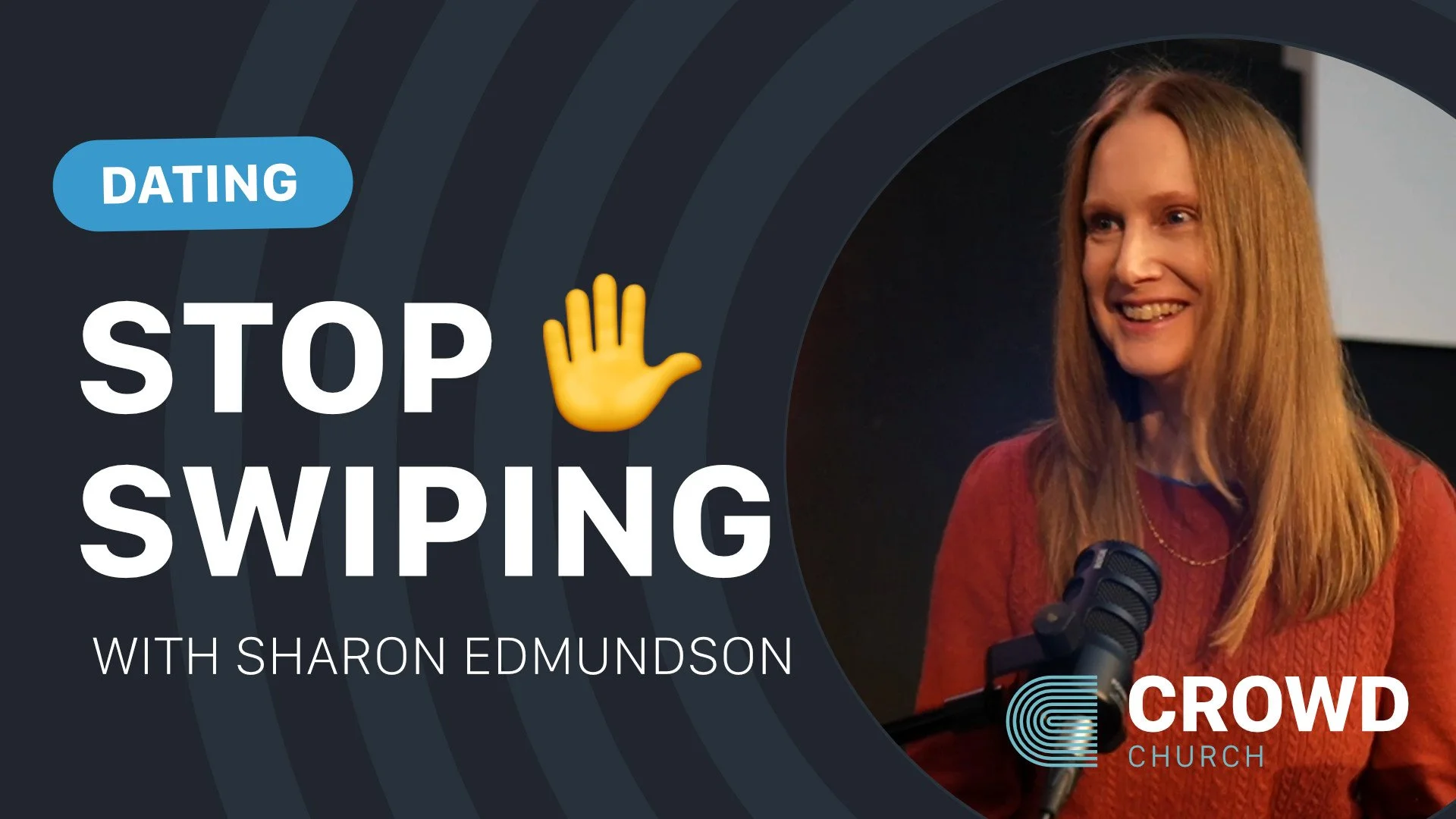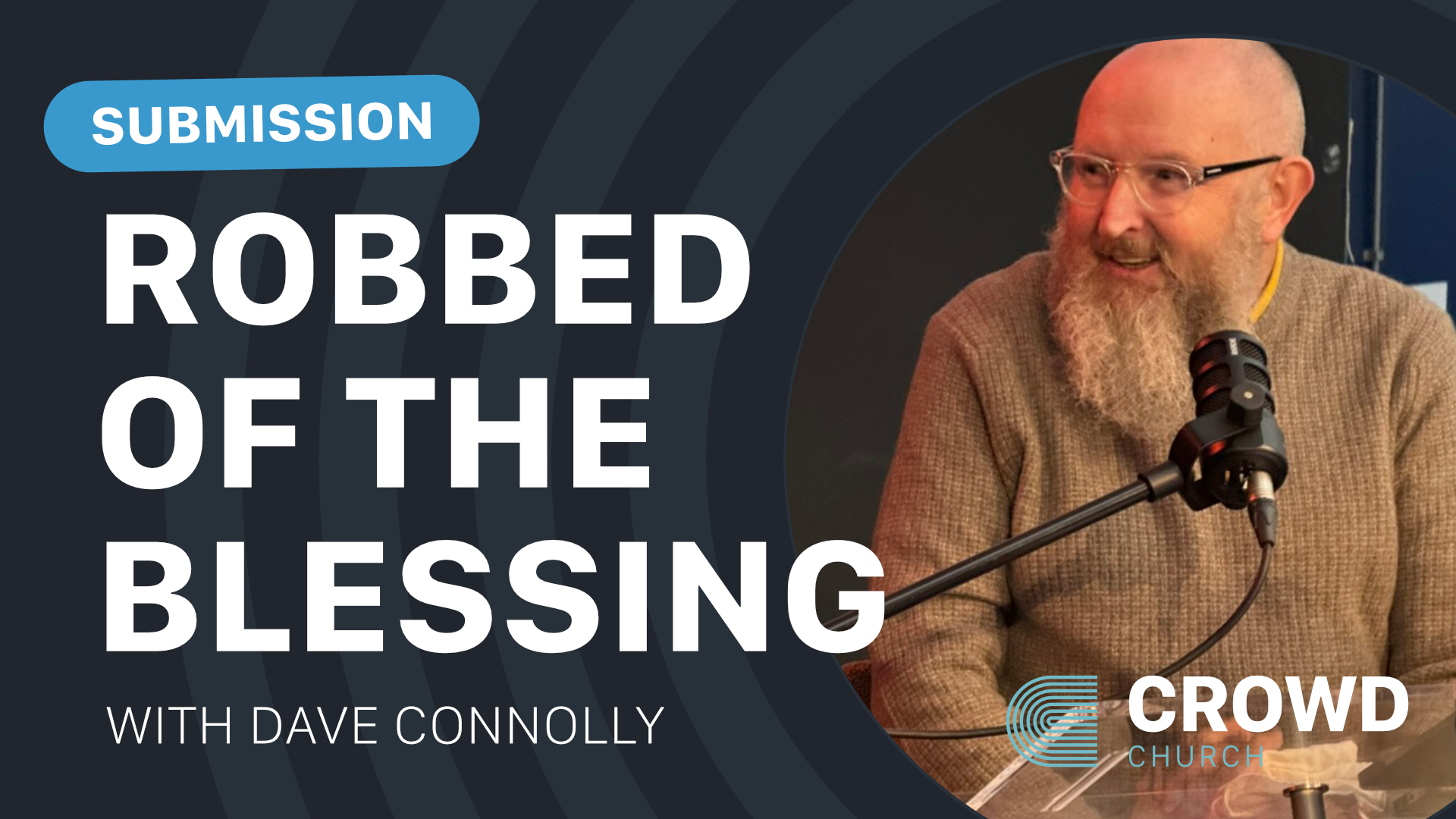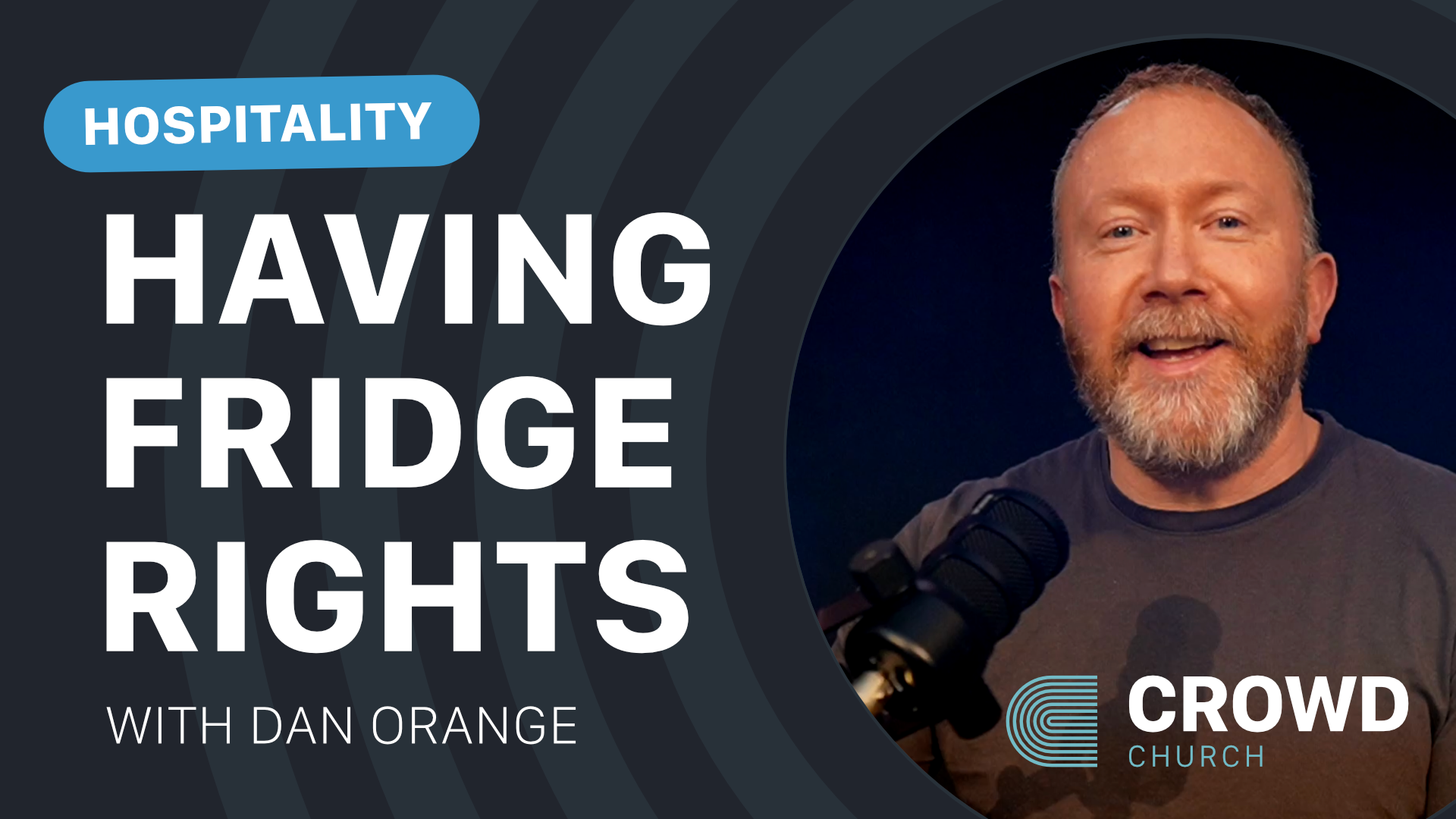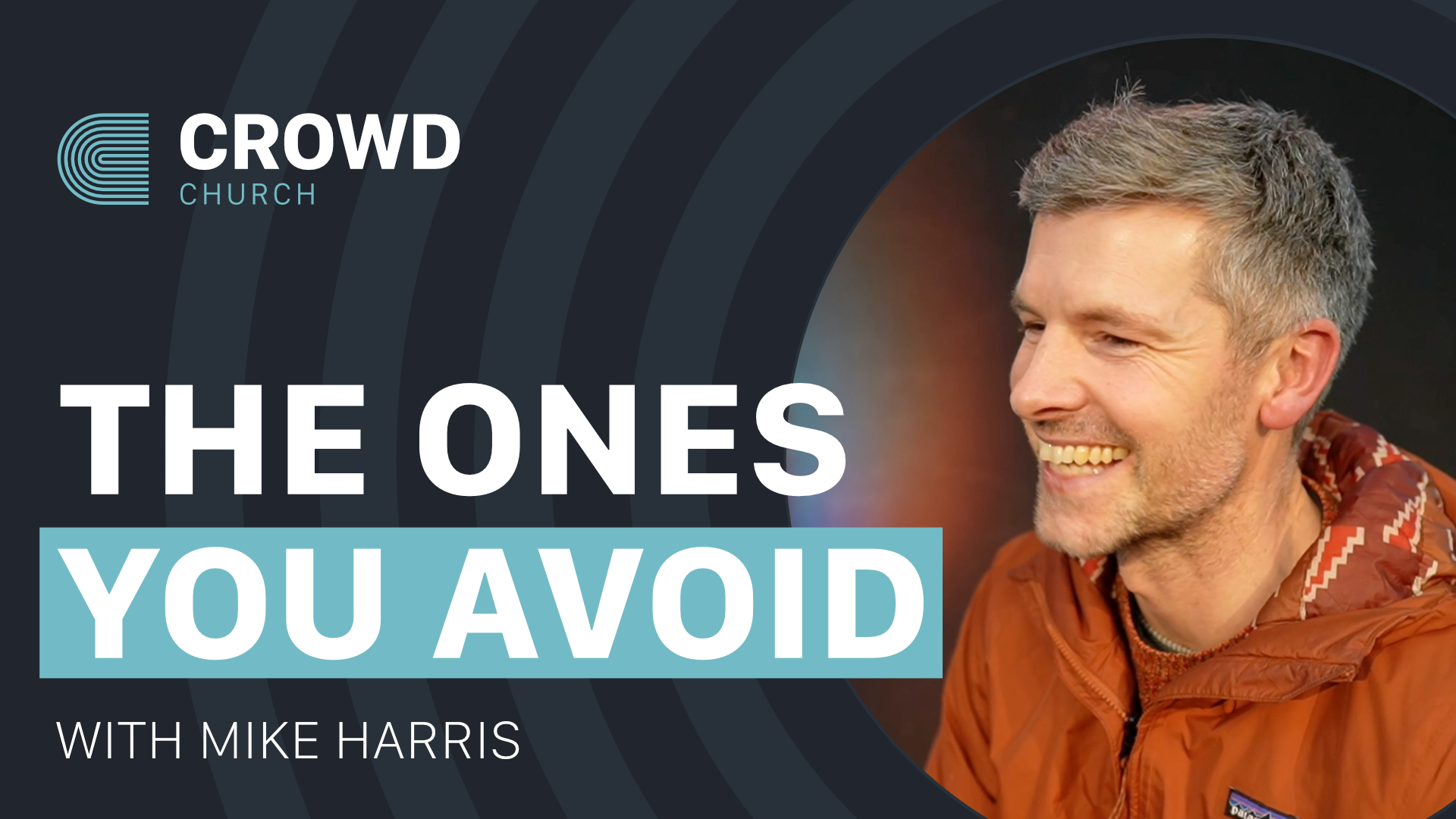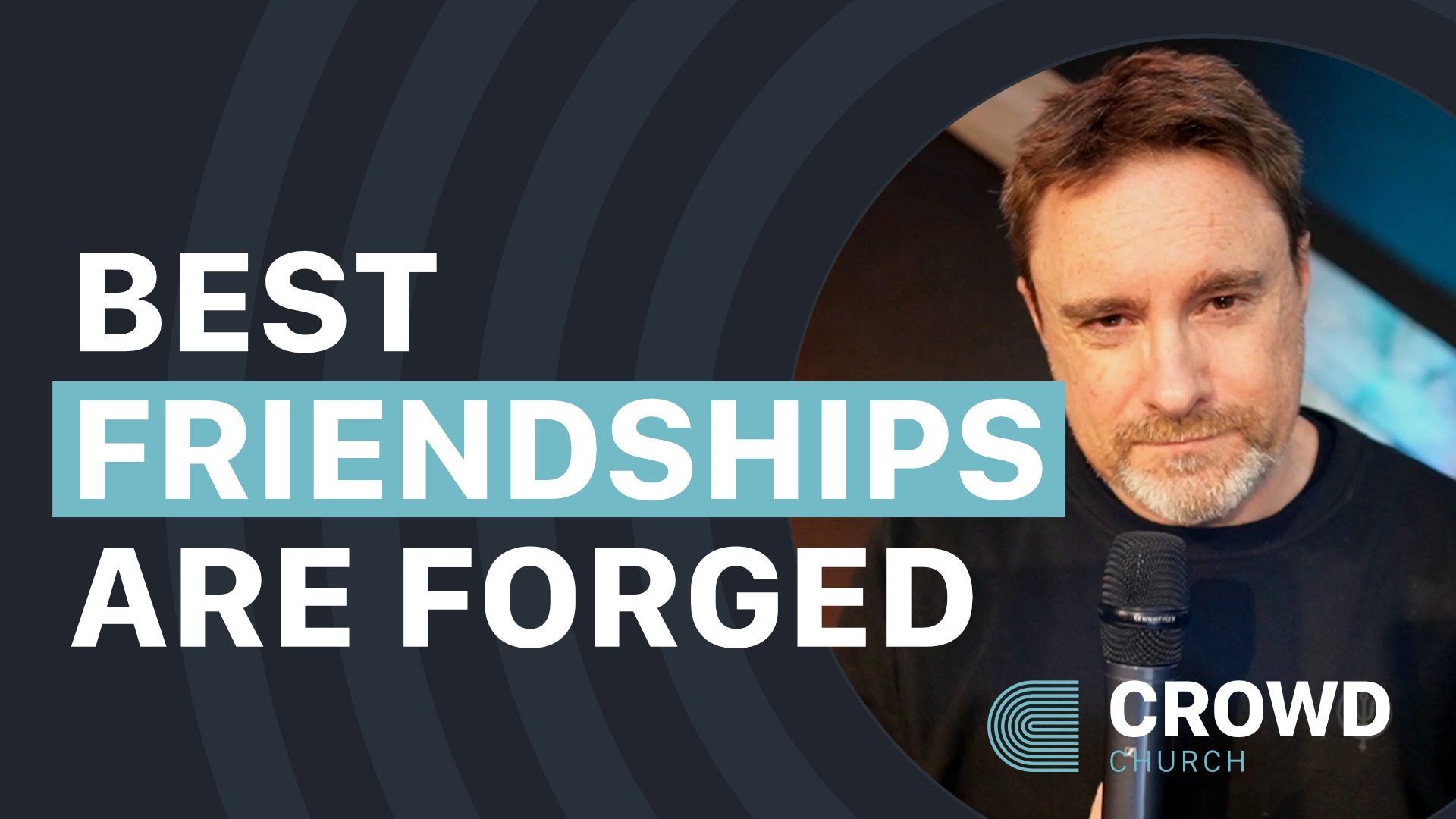Ancient Wisdom for Modern Chaos (Sacred Rhythms Part 2)
When the World Feels Like It's Falling Apart
Ever feel like you're drowning in negative news? Switch on the telly and it's another crisis. Open social media and everyone's arguing about something. Check the headlines and it's economic chaos, political upheaval, or global uncertainty - again.
This week, Ade Birkby talks about how to handle the overwhelming uncertainty of modern life. Rather than pretending everything's fine or getting swept away by the chaos, what if there's an ancient approach to uncertainty that our ancestors knew but we've forgotten? And what if the reason we're struggling isn't just the circumstances, but how we're choosing to engage with them?
Are We Mainlining Negativity?
The average person spends 28 hours a week watching TV. When you add in all forms of media - newspapers, radio, social media, streaming - we're looking at 57 hours a week. That's nearly half our waking hours being shaped by what we choose to consume.
And the media has a proven negative bias. Magazine sales jump 30% with negative covers. We're twice as likely to share bad news on social media. And research from the University of California showed something remarkable - people who watched six hours of media coverage about the Boston Marathon bombing experienced more acute stress than those who were actually there in person.
Think about that. Consuming negative media can be more traumatic than living through the actual event.
God's Framework for Uncertain Times
Ade pointed us to three biblical principles that completely flip how we can approach uncertainty:
1. Viewing Uncertainty in Context
Philippians 3:20 says: "Our citizenship is in heaven, from which we also eagerly wait for a saviour, the Lord Jesus Christ."
2 Corinthians 5:20 calls us "ambassadors for Christ" - representing our true nation in a foreign land.
This isn't escapism. It's perspective. Whatever chaos we're experiencing here is temporary. Our earthly struggles are short-lived compared to eternity. We're not meant to be at home in this world's systems - we're ambassadors from somewhere better.
2. Having a Virtuous and Positive Focus
Philippians 4:8 gives us a filter for what deserves our mental energy: "Whatever is true, whatever is noble, whatever is right, whatever is pure, whatever is lovely, whatever is admirable - if anything is excellent or praiseworthy - think about such things."
This isn't toxic positivity. It's strategic consumption. When we think about "true" in biblical terms, we mean things that reflect God's character. "Noble" means high moral integrity. "Right" conforms to God's will. "Pure" is free from moral corruption.
We have more control than we think over what we absorb. The more positive, God-honouring content we consume, the less space there is for the negative.
3. Taking Time Out in a Simplistic Manner
Ade explored Sukkot (the Feast of Tabernacles) from Leviticus 23:33-44. For seven days, Israelites would:
Do no customary work on the first and eighth days
Dwell in simple booths (temporary shelters)
Focus on community, worship, and gratitude
Remember God's provision during their wilderness wandering
Compare this to our modern holiday stress - the financial pressure (average UK main holiday costs £3,000), over-scheduling, social media pressure for perfect photos. We've turned rest into another performance.
Make It Real
Here's how this works in actual life:
At Work: Instead of starting your day scrolling through crisis headlines, begin with something that reflects God's character. Read a Psalm, listen to worship music, or simply pray. Set boundaries around news consumption - maybe check updates once a day rather than constantly.
In Relationships: When conversations turn to anxiety about the future, gently redirect to what God has proven faithful in before. Share stories of provision rather than amplifying fears.
During Rest: Follow the Sukkot principle - keep it simple. Instead of cramming holidays with activities and pressure, create space for community, gratitude, and actually noticing God's goodness.
In Crisis: Remember you're an ambassador. This world's chaos doesn't define your reality - God's kingdom does. Ask what perspective heaven brings to your current circumstances.
Ade's Story
Ade and his wife are living this out in the most challenging circumstances. His wife has developed moderate to severe ME (Myalgic Encephalomyelitis) - a condition that brings fatigue, cognitive dysfunction, sleep disturbance, and pain. Any exertion leads to post-exertional malaise that can leave her barely able to move.
The prognosis is uncertain and long-term. There's no cure. Best case, she might improve slightly. Worst case, the condition could progress significantly.
Rather than being crushed by this uncertainty, they've applied these biblical principles:
Perspective: Acknowledging this could be their reality for their earthly lives, but remembering it's temporary in eternal terms.
Positive Focus: Avoiding excessive news, minimal social media, focusing on what they can do in their current space - wildlife sanctuaries, appreciating nature, spending quality time together.
Simple Rest: Life has become more observational and less scheduled. They can't over-programme because it would make her condition worse.
These biblical concepts haven't removed their challenges, but they've helped them manage mentally, physically, and emotionally.
Your Next Step This Week
Here are practical ways to apply ancient wisdom to modern chaos:
Media Diet Audit: Track how much negative news you consume versus positive, life-giving content. What would happen if you flipped that ratio?
Philippians 4:8 Filter: Before consuming any media, ask - is this true, noble, right, pure, lovely, or admirable? If not, why give it your mental space?
Citizenship Check: When anxiety about current events hits, remind yourself - "I'm an ambassador here, not a permanent resident. What does my true homeland say about this situation?"
Simple Sabbath: Plan one completely unscheduled day this week. No agenda, no pressure to be productive. Just space to notice God's goodness.
Gratitude Practice: End each day by identifying three things that reflected God's character or provision, however small.
The Big Picture
Here's what Ade helped us see - we have far more control over our peace than we think. Not control over circumstances, but control over what we allow to shape our minds and hearts.
Popular culture says security comes from controlling circumstances - more money, better insurance, perfect plans. Biblical wisdom says peace comes from embracing uncertainty while trusting the One who never changes.
The tools are all there in scripture. We just need to use them. It might mean going against the grain, being a bit different from how everyone else responds to uncertainty.
So here's a question worth asking: are you prepared to let ancient wisdom guide you through modern chaos? Because in a world that seems to be falling apart, maybe the secret isn't trying to hold it all together - maybe it's remembering who's actually in control.
-
ade
[00:00:00] Well, hello and welcome to Crowd Church's non-live, live stream here in August. My name is Matt, and I just wanted to jump on here before we get into the talk and let you know what's going on. Now this isn't your usual crowd service, uh, and that, if I'm honest, is completely intentional. If you are a regular crowd, you will have twigged that this isn't the usual live.
There's no, you know, no me fluffing lines or figuring out technical difficulties, or Anna laughing at me when I do 'cause something has gone completely wrong. Uh, and you definitely won't be getting conversation Street today. But here's the thing, August for crowd is different, isn't it? It's always different for everybody.
Uh, half of us usually are somewhere hot trying to forget what the weather's like back home, especially if you live in England. And the other half is wondering why we didn't book something ages ago. [00:01:00] Uh, so instead of pretending everything's normal, we've done something a bit different. Yes, we like to do the non-live, live streams in August where the whole team gets to rest.
And recuperate. Uh, but we obviously still want to put stuff out for people to connect with, and this year, our August talks, uh, are prerecorded as usual and on live, live stream. You can watch them whenever you like. Whether that's Sunday morning with, you know, a cup of tea or Wednesday afternoon when you're avoiding doing something important.
Whenever we just might, uh, this is August, we're exploring something called Sacred Rhythms. Looking at how biblical festivals offers a completely different approach to rest, to celebration and actually living life. Well, I thought this would be a really good thing to study. Whilst we do our normal holidays, like what does the Bible have to say about taking a holiday, uh, an inner culture that's obsessed with, you know, working ourselves into the ground and then [00:02:00] collapsing for two weeks somewhere with overpriced cocktails.
Maybe just, maybe the Bible has a better way. Maybe there's some ancient celebration, uh, that knew something that we've forgotten about. You know, like what does it actually mean to truly rest and to celebrate and to recover? So that's why we're doing this. So settle in. This one's just for you. No pressure to participate, no need to unmute yourself.
Just space to think about how God might want to reshape the rhythms of your life. So let's dive in.
Good evening. Today's talk is titled Ancient Wisdom for Modern Chaos. US Forefather. Benjamin Franklin is famous for saying, in this world, nothing is certain except death, taxes, and change. When you think about it, death and taxes pretty specific change. On the other hand, it's a very [00:03:00] wide topic and a very uncertain topic.
Now, I don't think anyone will argue that we live in an on certain world. If we look at the last five years, there's been a lot of big world events that have hit us back at home. Pretty much no matter where we are. We had lockdown and COVID-19, who could have imagined we would've literally locked countries down for extended periods of time.
And the impact of that long COVID mental health, increased shipping costs, meaning businesses struggling and ultimately unemployment. We've had Brexit. Again, who could have predicted that outcome, but that has resulted in more unemployment, increased goods, cost, travel restrictions, and over here, even some increased racism.
On top of that, it's been the Ukraine War. Again, something we never would've imagined in this day and age, and it's impacting us back at home with increased petrol costs, [00:04:00] destabilized global economy, and an influx of refugees. More recently, the US tariff war. Again, increased goods cost in some cases leading to unemployment.
In the uk we've had a recent government change and their recent budget, again, you've guessed it, it's led to increased unemployment and also, uh, public morale going down. In light of all this, we've had the cost of living crisis, which is ongoing and issues with climate change and the weather. Now, all of these things.
Impact or have the ability to impact our mental health. Now, the uncertainties that we face are regularly reinforced to us by the media. Our survey was done last year by PQ Media, a company that look at those kind of, uh, data analytics, and they found on average people spend 28 hours watching TV a week.
And if we were to [00:05:00] expand that to all forms of traditional and digital media, so newspapers, radio, tv, socials, all that stuff, 57 hours a week on average. And that seems quite a lot when you think, well, we have about 112 a waking hours a week, assuming or sleeping eight hours a night. Nearly half of that. We are being exposed to media or allowing ourselves to be exposed to media on average.
Now, media tends to have a negative bias, and I'm not just saying that there are plenty of studies backing it up. London School of Economics, um, and a recent, uh, blog posts showed how magazine sales go up 30% with a negative cover. Cambridge University in a study on social media showed users are twice as likely to share negative news.
And we think if that isn't bad enough, the [00:06:00] impact of this can be quite substantial. Now, this is illustrated really well in a study the University of California did on the Boston Marathon bombings. These happened back in 2013. Uh. Quite close to the finish line. A couple of homemade bombs were detonated.
Uh, this resulted in three dead and 264 people injured. The, uh, focus of the study was really looking at the impact of media versus being directly exposed to the event. So, uh, how people were impacted just by being told about the event to actually living through it. And interestingly, they found that. Six plus hours of exposure to bombing related media actually gave more acute stress for living through the bombings in person, and the implications of this being that mass media may spread negative consequences of trauma beyond directly [00:07:00] affected communities.
This brings us to our problem. We live in a highly uncertain world, exasperated by negative media. And it's impacting our mental health to one degree or another. If ever there was a time we needed some guidance from the Bible, this is definitely one of those times and we're gonna look at a few relevant biblical concepts and they are viewing uncertainty and context, having a virtuous and positive focus, taking time out in a simplistic manner.
Philippines three 20 says, for our citizenship is in heaven, from which we also eagerly wait for a savior. The Lord Jesus Christ. Our earthly citizenship is finite. Heavenly citizenship is eternal, so our earthly struggles are going to be short-lived by comparison. Now second [00:08:00] Corinthians five 20 refers to us as Ambassadors for Christ, and Ambassadors live and represent their nation in a foreign land.
So whatever we are going through here it is as we are going through in a foreign land, heaven is ultimately where we belong. Philippines, four eight says, finally, brothers and sisters, whatever is true. Whatever is noble, whatever is right, whatever is pure, whatever is lovely, whatever is admirable. If anything is excellent or praiseworthy, think about such things.
Now, that's a very positive focus. Now, when we think about these aspects in the biblical context, and we say true, we mean something that reflects God's character, his words, or his actions. When we talk about Noble, we think of high moral character of integrity. When we speak about right, [00:09:00] something that conforms to God's will, law and character.
When we think about pure, we think about something that is free from moral corruption. How many things in the media are we seeing for even moral corruption when we think about lovely. We're thinking about things which are pleasing and beautiful in both physical appearance and character, and finally admirable.
We're thinking about something that is worthy of respect and admiration due to it reflecting God's character. Now we have a certain amount of control in the things that we absorb. You know, we tend to think about what surrenders. We have some control over that. The more positive content and things we absorb, the less time for the negative.
Now, I'm not saying that we just stick our heads in the sand and avoid the negativity, but where we can, where we can look at things which are pure and good and right, and positive, it will help us. [00:10:00] Again, thinking back to, uh, the, um, example of the uh, Boston Marathon bombing study. So if the impact of six or so hours negative media had greater stress, what would the impact of something truly positive had in its place?
And finally, when we think about taking time out, uh, Leviticus 2333 to 44 talks about circuit, also known as the Feast of the Tabernacles. Uh, reading from verse 33, then the Lord spoke to Moses, say. Speak onto the children of Israel saying The 15th day of the seven month shall be the feast of a tabernacle.
For seven days to the Lord on the first day, there shall be a holy convocation. You shall do no customary work on it. For seven days, you shall offer an offering made by fire to the Lord. On the eighth day, you shall have a holy convocation. [00:11:00] And you shall offer an offering made by fire to the Lord. It is a sacred assembly and you shall do no customary work on it.
Uh, later in verse 42, it talks about, uh, dwelling in boos. You shall dwell in boos for seven days. All of you who are Native Earth Israelites shall dwell in booths that your generations may know. I made the children of Israel dwell in booths when I bought the matter of the land of Egypt. I am Lord your God.
So the word holiday comes from holy day, and the function of these things were to be a living experiential reminder of God through relationship with. They also commemorated significant events and they were often a public holiday as well where no work was done. Now in the case of, uh, circuit the Feast of the Tabernacles, it was commemorating time in the desert and also being [00:12:00] thankful for the harvest they just bought in.
If we think about this now in terms of the emerging trend in in holidays that we're seeing, there's a lot of financial pressure. You know, based around expensive holidays, expensive gifts. Um, EasyJet did a, a recent, um, what they call the Great British Holiday audit. And they said on average people go on three trips a year in the uk, the main holiday costing, uh, 3000 pounds.
That's just the main one. Uh, when we think about, uh, other trends these days. We tend to over schedule holidays and that can create a lot of pressure. And then is the pressure of social media getting most perfect holiday pictures? And the impact of all of this, um, is not the relaxing holiday you would hope for.
It actually can create anxiety and depression, especially in people who already have preexisting mental issues. It can create burnout on [00:13:00] holiday, and it can also strain the relationships of the people who are going on holiday.
Coming back to, it's like I say, celebration of the harvest and commemorating the wilderness. The focus is on God, and it's really this community experience. So they're doing no work on the first and the eighth stage, prioritizing rest. They're dwelling in booth, which are very simplistic tense, and there's, there's not much else happening there.
There's, uh. Coming together as a, as a nation for, um, different worship ceremonies and eating together and just experiencing community, something we can really learn from. This is when we, when we take time out, it's important that we unplug that. We keep it simple. We find joy in the simple things and simple experiences and God's presence.
When we look at how popular culture deals with uncertainty versus how [00:14:00] the Bible. Deals of uncertainty, we can, we can see some significant differences. So popular culture is all about controlling the circumstance. It's safety and money and possessions. It's insurance policies. It's ultimate focus is is on, on material things.
Whereas biblically, it's all about embracing the uncertainty very often. Will change our hearts and our attitudes rather than the circumstances that are happening around us. And ultimately the focus of this is, is on him. So where do we go from here? You know, we've seen some biblical concepts, which let's face it, they're really in line with stuff we know.
I mean, how many times we've been told to put our problems into perspective, just get away from focusing on them, just taking a, taking a step back and viewing in a wider concept. Uh, we're all familiar with the, um, the popular phrase, garbage in, garbage out. Well, you know, surely [00:15:00] positive in, positive out, and certainly the science, um, reflects that when it comes to psychology.
And then finally, you know, just taking time out in a simplistic, chilled manner. And back to today when holidays were relaxed and not overcrowded and over crammed. The tools are all there. We just need to use them. It might mean going against the grain and being a bit different, but are we prepared to, are you prepared to now speaking from experience, my, my wife and I are literally living through this right now and that's aside from all of the stuff that's happening outside in the world that we've talked with that are influencing us, um, in the last year or so, my wife has, uh, come down with moderate to severe me, I wanna say come down actually.
Regressed to that stage. It's really gotten worse in the last 12 months, and so her life is full of fatigue, cognitive dysfunction, sleep disturbance, muscular and neurological pain. [00:16:00] Whenever she even tries to push herself just a tiny bit, we get this post exertional malaise, which just elevates all the symptoms and leaves her hardly able to move.
So the reality is her days are spent sitting in a recliner chair or a wheelchair or in bed. The prognosis is long term, indefinite. It's under researched, it's unpredictable. There is no cure. Best case scenario, she might get a tiny bit better. Worst case scenario, she'll get a lot worse and end up being fed through a tube.
So as you can imagine, we've had to make some pretty. Significant changes in our life and to really put things into perspective. And so for us, we have to acknowledge that, you know what? This could be it for our earthly lives. There was a grieving process we went through, and if I'm a hundred percent honest, we might still be going through it, but we recognize this is short in terms of our days here on earth, but [00:17:00] not in heaven.
We try and keep things positive. We avoid. Looking at the news too much. We have mineral minimal interaction on social media, and we focus on what we can do in the space that we have left. Now that our lives have gotten much, much more and more limited. And a lot of this stuff is observational. You know, we've now taken the time to go to wildlife sanctuaries and to just sit there and, and watch nature.
Um, we, we spend more time watching movies than we used to and appreciating that it's all. Positive things that we can, we can do. And when it comes to taking time out, now that one's a bit of a hard one because I've become my wife's primary carer. And so even if I stopped my job and work, I'm still doing that job.
And for her as a patient, well, life is kind of like a timeout. She's not able to do things anyway. So life is one big rest for the want of a better word. Um, but it's always chilled. It's [00:18:00] never overscheduled. Goodness, we can't do that because will it make her much worse? So as you can see, we have actually taken the concepts that we've discussed here, which biblical we've applied into our lives, and yes, they have helped us manage mentally, physically, and emotionally what it's that we have to deal with.
So that's all I have for you this evening. Um, or this morning, depending where you are in the world. Have a wonderful rest of your day. God bless. Well, thank you so much for joining us, and there we are, the end of this particular talk. Now, if you're a regular crowd, this is a bit where we go into Conversation Street, but like I said at the start, we're not doing that during August in a, what we call the non-live live streams where the team is just taking some.
Well earned rest and just hang in with their families. Uh, but do stay with us as we talk about [00:19:00] holidays and rhythms and rest throughout August. And maybe there's just a different way to the standard default. Maybe, you know, God's got an idea or two that we could learn from, you know, ways that God has designed life to perhaps work better for us.
I think he probably has. Uh, and maybe this week you want to try, you know, something from the talk. What stood out to you? It might not even be dramatic. It could be just a tiny step towards that kind of rhythm that actually brings you life rather than draining it. What is it gonna be? Uh, if you're still watching this, write it in the comments.
Um, even though we're not live, it's always good just to write things down. And of course you can reach us on our website at www dot Crowd Church. Now we're gonna be back next Sunday, uh, with another talk. If it's in August, it's gonna be an on live, live stream. If this is the last talk in August or August, in August, we'll be back to, uh, the usual way of doing things in September.[00:20:00]
But in August, do say stay with us as we continue journeying through the sacred rhythms. Uh, same time, same non-live stream approach. So that's it. Uh, but for now, wherever you are, where whatever living room you are, watching this or wherever you're on a beach, on a plane, we don't mind. That's the beautiful thing about digital church.
Uh, just remember that rest isn't something you have to earn. It's something that God simply gives you. See you next week.
More From The Becoming Whole Series
At Crowd Church, we are committed to creating a space for you to explore the Christian faith, regardless of where you are on your faith journey.
What happens at Crowd Church?
Every week we livestream our online church service and release a new story on What’s The Story Podcast. We have weekly online community groups that meet up and all of that good stuff. You can find out more about everything that goes on at Crowd by browsing through this site, and you can reach out to us via our contact page.
Come and Join In!
Are you interested in joining in with what is happening here at Crowd? We would love to meet you!
Come and join our in-person service in Liverpool.
Join in with the Church Livestream
Subscribe to Crowd Church Podcast & What’s the Story Podcast
Follow us on Instagram
Subscribe to the YouTube Channel
New to church? If so - check out the New Here link.
Any questions? Please connect with us via our Contact Page, or via WhatsApp: +44 7984 530 429


